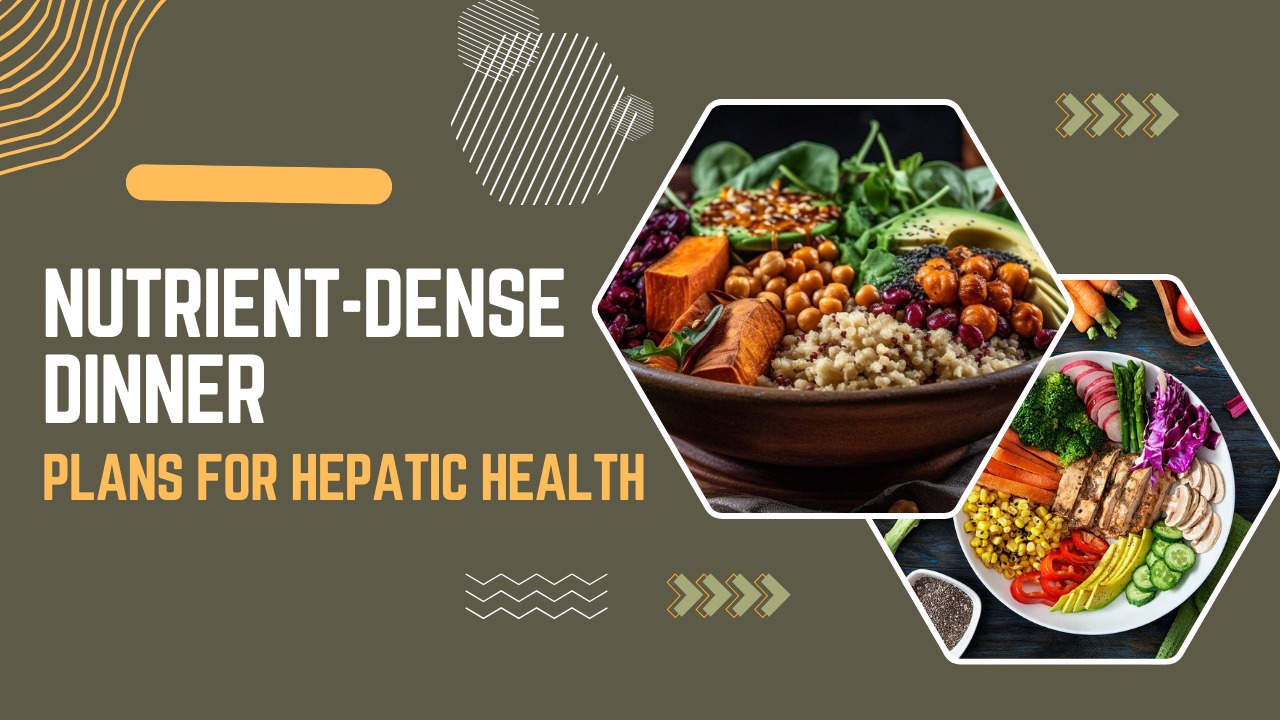The liver is one of the most vital organs in the human body, performing over 500 essential functions. It filters toxins from the blood, breaks down fats and carbohydrates, produces bile for digestion, and stores crucial vitamins. Despite its resilience, the liver is vulnerable to damage from poor diets, alcohol, sedentary habits, and exposure to toxins. Supporting liver health through lifestyle choices is more important now than ever.
A healthy liver is essential not only for digestion but also for boosting immunity, regulating energy, and aiding in detoxification. Even emotional balance can be affected by poor liver function. One of the most effective ways to nourish your liver is by eating clean, whole foods. Choosing the right meals—especially in the evening—can promote healing and regeneration overnight.
Focusing on nutrient-dense, anti-inflammatory dinner recipes for liver health can make a big difference. Think steamed vegetables, grilled salmon, turmeric rice, garlic-laced lentils, or lemon-dressed leafy greens.
In this article, we’ll explore eight top tips for creating liver-supportive dinners and provide detailed, wholesome recipes that are both healing and delicious. Whether you’re looking to prevent liver disease, manage a fatty liver diagnosis, or simply want to detoxify naturally, these dinner recipes and nutritional tips will set you on the right path.
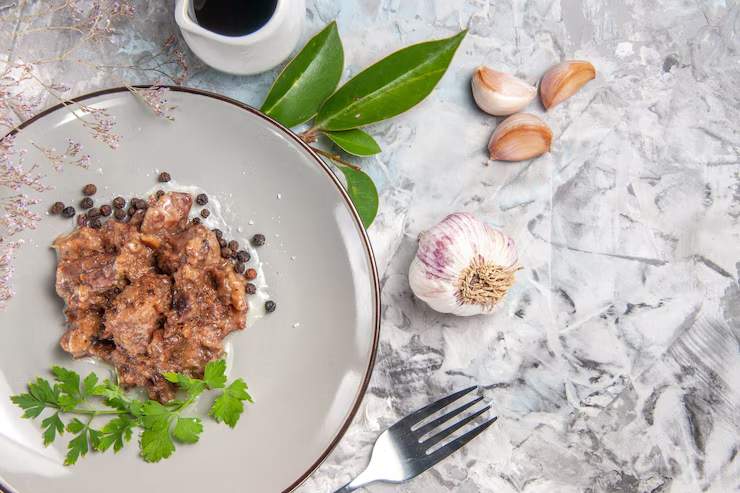
Top Tips for Liver-Healthy Dinners
Focus on Whole Foods
Focusing on whole foods is one of the most effective strategies to support liver health. Whole foods are unprocessed and packed with nutrients, fiber, and antioxidants that help the liver function efficiently. Unlike processed meals loaded with additives, whole foods reduce the toxin load on the liver, making it easier for this vital organ to cleanse the body naturally.
Incorporating a variety of colorful vegetables, lean proteins, whole grains, and healthy fats ensures that your body—and your liver—gets the nutrients it needs. These foods help reduce inflammation, improve digestion, and support the liver’s natural detoxification process. Avoiding processed sugars and refined carbs is equally important in preventing fat buildup in the liver.
When planning your evening meals, opt for clean, balanced dinner recipes for liver health. Examples include quinoa bowls with roasted vegetables, grilled fish with steamed broccoli, or lentil soup with turmeric and greens—all designed to nourish and protect your liver overnight.
Whole foods—fruits, vegetables, legumes, whole grains, nuts, seeds, and lean proteins—are nutrient-dense and free from harmful additives. They reduce the load on your liver and provide antioxidants and fiber to aid detoxification.
Include in dinner:
Quinoa, brown rice, lentils
Fresh vegetables like broccoli, kale, spinach
Lean proteins like tofu, beans, or organic chicken
Limit Saturated Fats and Avoid Trans Fats
Limiting saturated fats and avoiding trans fats is essential for maintaining a healthy liver. These unhealthy fats are often found in fried foods, processed snacks, and fatty cuts of meat. Over time, they can contribute to fat buildup in the liver, leading to conditions like Non-Alcoholic Fatty Liver Disease (NAFLD). Reducing their intake lightens the liver’s workload and helps it function more efficiently.
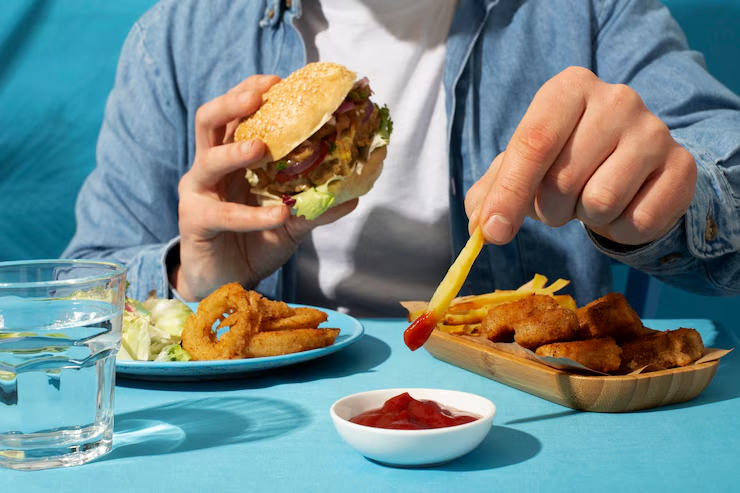
Instead, focus on healthy fats such as those found in avocados, olive oil, nuts, and fatty fish like salmon. These support liver cell repair and reduce inflammation. Replacing saturated and trans fats with healthier options can improve cholesterol levels and support long-term liver wellness.
When preparing your evening meals, choose dinner recipes for liver health that emphasize baked or grilled foods instead of fried, and use heart-healthy oils in moderation. Great examples include grilled salmon with sautéed spinach or quinoa-stuffed bell peppers drizzled with olive oil and lemon juice.
High-fat meals, especially those with saturated or trans fats, burden the liver and contribute to fatty liver disease. Choose healthy fats like omega-3s instead.
Good fat sources:
Extra virgin olive oil
Avocados
Flaxseeds and walnuts
Incorporate Cruciferous Vegetables
Cruciferous vegetables like broccoli, cauliflower, Brussels sprouts, and kale are powerful allies in promoting liver health. These vegetables are rich in glucosinolates, natural compounds that help activate liver enzymes responsible for detoxifying harmful substances. Including them in your meals can significantly enhance the liver’s ability to cleanse and regenerate.
These veggies are also high in antioxidants, fiber, and anti-inflammatory properties, which support digestion and reduce the risk of liver-related diseases. Regularly consuming cruciferous vegetables can help lower oxidative stress and improve liver enzyme levels, making them a must-have in a liver-friendly diet.
To reap the benefits, try adding cruciferous vegetables to your dinner recipes for liver health. Delicious options include roasted Brussels sprouts with garlic, broccoli stir-fry with turmeric, or cauliflower rice paired with grilled fish. These meals not only taste great but also provide your liver with the nutrients it needs to stay healthy and functional.
Vegetables like broccoli, cauliflower, Brussels sprouts, and cabbage are liver powerhouses. They increase the production of detoxification enzymes and reduce oxidative stress.
Try:
Roasted Brussels sprouts with garlic
Stir-fried broccoli with tofu
Use Liver-Cleansing Herbs and Spices
Liver-cleansing herbs and spices like turmeric, garlic, ginger, and cilantro are powerful natural remedies for enhancing liver function. These ingredients have anti-inflammatory, antioxidant, and detoxifying properties that support the liver’s ability to break down toxins and regenerate cells. Adding them to your meals regularly can help improve liver efficiency and overall health.
Turmeric contains curcumin, a compound known to reduce liver inflammation and stimulate bile production. Garlic enhances liver enzyme activity, while ginger soothes digestion and helps reduce fat accumulation in the liver. Cilantro supports heavy metal detoxification, making it another excellent addition to your diet.
Incorporating these powerful herbs and spices into your dinner recipes for liver health is easy and flavorful. Try turmeric-seasoned lentil soup, garlic-roasted vegetables, or a ginger-infused quinoa bowl with steamed greens. These simple additions not only elevate the taste of your meals but also help your liver stay clean, healthy, and strong.
Many herbs and spices help the liver detox naturally. Turmeric, ginger, garlic, and milk thistle are among the most beneficial.
Use in recipes:
Add turmeric to lentil stews
Use garlic in roasted vegetables
Stay Hydrated with Soups and Stews
Staying hydrated is essential for optimal liver function, and one delicious way to support hydration is through warm, nourishing soups and stews. These meals not only provide fluids but also supply essential nutrients that help flush toxins from the liver. Ingredients like vegetables, legumes, and lean proteins simmered in broth create a soothing and supportive environment for liver repair.
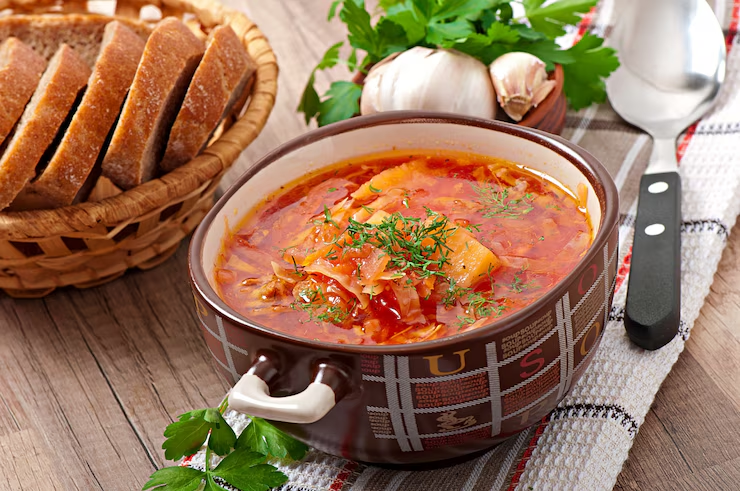
Soups and stews are easy to digest, making them ideal for the evening meal when the liver prepares for overnight detoxification. When made with liver-friendly ingredients such as garlic, turmeric, leafy greens, and cruciferous vegetables, they can reduce inflammation and support natural detox processes. These dishes also help regulate digestion and blood sugar levels.
Try adding hydrating, nutrient-rich options to your dinner recipes for liver health like lentil and kale stew, turmeric vegetable soup, or a ginger-infused chicken broth. These meals are comforting, healing, and packed with ingredients that support your liver’s well-being.
Dinner doesn’t always need to be solid. Broth-based soups and light stews hydrate your body and support liver function while providing essential nutrients.
Try:
Lentil soup with kale and carrots
Miso soup with tofu and seaweed
Avoid Added Sugar and Processed Carbohydrates
Avoiding added sugar and processed carbohydrates is vital for protecting liver health. These ingredients are commonly found in white bread, pastries, sugary drinks, and packaged foods, all of which can contribute to fat buildup in the liver. Over time, this can lead to insulin resistance and conditions like Non-Alcoholic Fatty Liver Disease (NAFLD).
Instead of processed carbs, choose whole grains like quinoa, brown rice, or oats, which provide steady energy and support metabolic function. Minimizing added sugar also helps reduce inflammation and oxidative stress, both of which negatively impact the liver. A cleaner diet allows the liver to perform its detoxification functions more effectively.
For a healthy evening meal, opt for dinner recipes for liver health that include complex carbs and natural ingredients. Examples include quinoa-stuffed peppers, brown rice with sautéed greens, or roasted sweet potatoes with herbs. These meals offer balanced nutrition without the harmful effects of added sugars and refined carbs.
Sugar contributes to insulin resistance and fat buildup in the liver. Refined carbs act similarly. Opt for low-GI, high-fiber options.
Instead of:
White rice → use quinoa
White pasta → try lentil or chickpea pasta
Include Fiber-Rich Foods
Including fiber-rich foods in your diet is one of the most effective ways to support liver health. Fiber helps regulate digestion, maintain healthy blood sugar levels, and reduce the absorption of toxins—all of which ease the liver’s workload. Soluble and insoluble fibers also aid in cholesterol regulation, lowering the risk of fatty liver disease.
Foods rich in fiber include lentils, beans, whole grains, vegetables, fruits, and seeds. These not only keep you full longer but also support gut health, which is closely linked to liver function. A fiber-rich diet helps reduce inflammation and promotes the elimination of waste through regular bowel movements, allowing the liver to focus on detoxification.
Incorporate high-fiber choices into your dinner recipes for liver health with meals like lentil soup with spinach, quinoa and black bean bowls, or steamed vegetables with barley. These delicious options not only improve liver health but also enhance overall wellness and energy.
Fiber binds to toxins and helps excrete them from the body. It also reduces cholesterol, supports gut health, and decreases inflammation.
Best fiber-rich foods for dinner:
Lentils, black beans
Sweet potatoes, oats
Leafy greens
Choose Plant-Based Meals Often
Choosing plant-based meals often is a smart and natural way to support liver health. Plant-based foods are rich in antioxidants, fiber, vitamins, and minerals that aid liver detoxification and reduce inflammation. Unlike animal-based meals high in saturated fats, plant-based options are easier on the liver and promote cleaner digestion.
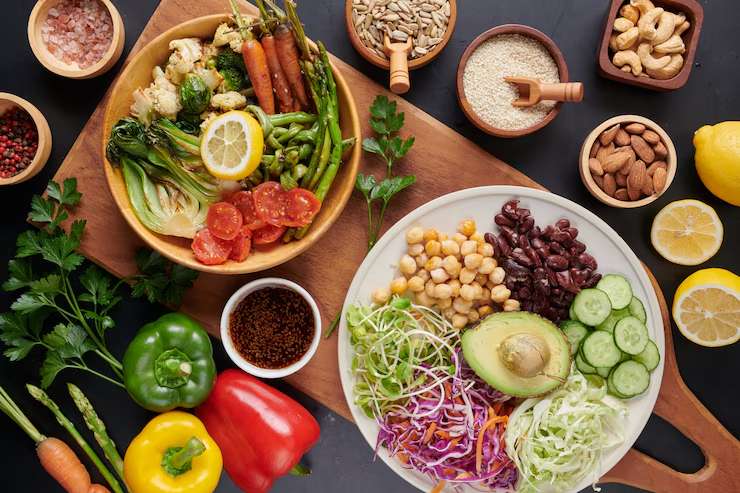
Fruits, vegetables, legumes, whole grains, seeds, and nuts all contribute to better liver function. These foods help reduce fat buildup in the liver, regulate blood sugar levels, and improve metabolic efficiency. A plant-based diet is also linked to lower risks of Non-Alcoholic Fatty Liver Disease (NAFLD) and improved cholesterol levels.
Incorporate more plant-focused options into your dinner recipes for liver health by trying meals like vegetable stir-fry with tofu, lentil and spinach curry, or quinoa and roasted veggie bowls. These meals are not only satisfying and flavorful but also give your liver the nourishment it needs to thrive.
Plant-based meals are naturally anti-inflammatory and detoxifying. A few meat-free dinners per week can significantly reduce liver stress and boost overall health.
Consider:
Veggie stir-fry with tofu
Chickpea curry with brown rice
Liver-Healthy Dinner Recipes
Liver-healthy dinner recipes are essential for supporting detoxification, reducing inflammation, and improving overall liver function. A nutritious evening meal allows the liver to perform its overnight repair and cleansing processes more efficiently. Choosing meals with whole foods, healthy fats, fiber, and lean proteins can significantly boost liver wellness.
Look for dinner recipes for liver health that include ingredients like leafy greens, garlic, turmeric, lentils, cruciferous vegetables, and omega-3 rich fish like salmon. These foods provide antioxidants, reduce fat accumulation in the liver, and support bile production. Avoiding processed foods, added sugars, and excessive red meat is equally important for maintaining a clean, functioning liver.
Some great dinner recipes for liver health include grilled salmon with steamed broccoli, lentil soup with turmeric and spinach, or quinoa and roasted vegetable bowls with lemon-tahini dressing. These meals are easy to prepare, flavorful, and packed with liver-loving nutrients to keep your body balanced and energized.
Here are eight flavorful and healing recipes that follow the tips above and are designed to protect and support your liver health.
Turmeric-Spiced Lentil and Spinach Stew
Ingredients:
1 cup red lentils, rinsed
1 onion, chopped
2 garlic cloves, minced
1-inch fresh ginger, grated
1 tsp turmeric
1 tsp cumin
1 tsp coriander
6 cups vegetable broth
3 cups baby spinach
1 tbsp olive oil
Juice of 1 lemon
Instructions:
Sauté onion, garlic, and ginger in olive oil until soft.
Add spices and cook for 1 minute.
Add lentils and broth. Bring to a boil, then simmer for 25 minutes.
Stir in spinach and cook for another 5 minutes.
Finish with lemon juice before serving.
Benefits: Anti-inflammatory, high in fiber, and rich in antioxidants.
Quinoa-Stuffed Bell Peppers
Ingredients:
4 large bell peppers, halved and cleaned
1 cup cooked quinoa
1 cup black beans
1 small zucchini, diced
1 carrot, shredded
1/2 onion, chopped
1 tsp smoked paprika
2 tbsp tomato paste
1 tbsp olive oil
Fresh parsley, chopped
Instructions:
Preheat oven to 375°F (190°C).
Sauté onion, zucchini, and carrot until soft.
Mix vegetables with quinoa, beans, tomato paste, paprika, and parsley.
Fill peppers with the mixture and place in a baking dish.
Bake for 30 minutes until peppers are tender.
Benefits: Fiber-rich, plant-based, and loaded with liver-detoxing veggies.
Broccoli and Tofu Stir-Fry with Ginger Sauce
Ingredients:
1 block extra-firm tofu, cubed
2 cups broccoli florets
1 carrot, julienned
1 red bell pepper, sliced
1 tbsp sesame oil
2 tbsp low-sodium tamari
1 tbsp rice vinegar
1 tbsp grated ginger
2 garlic cloves, minced
Instructions:
Sauté tofu until golden brown, then remove from pan.
Add broccoli, carrot, and bell pepper to the same pan. Stir-fry for 5–7 minutes.
Mix tamari, vinegar, ginger, and garlic. Pour over veggies.
Return tofu to the pan and stir to coat evenly.
Benefits: High in protein, antioxidant-rich, and supportive of detox enzymes.
Baked Salmon with Garlic Kale and Sweet Potatoes
Ingredients:
2 salmon fillets
1 tbsp olive oil
2 cups chopped kale
1 sweet potato, cubed
2 garlic cloves, minced
Lemon wedges
Salt and pepper to taste
Instructions:
Preheat oven to 400°F (200°C).
Toss sweet potatoes with oil, salt, and pepper. Bake for 25 minutes.
Rub salmon with olive oil, garlic, salt, and pepper. Bake for 12–15 minutes.
Sauté kale in olive oil and garlic until wilted.
Serve salmon with kale and roasted sweet potatoes, with lemon on the side.
Benefits: Omega-3s from salmon, fiber and vitamin A from sweet potatoes, and liver-cleansing kale.
Chickpea and Spinach Coconut Curry
Ingredients:
1 can chickpeas, rinsed
2 cups spinach
1 onion, chopped
1 tomato, chopped
1 cup light coconut milk
1 tsp turmeric
1 tsp curry powder
1 tsp cumin seeds
1 tbsp olive oil
Instructions:
Sauté cumin seeds in oil. Add onion and cook until golden.
Add turmeric, curry powder, and tomato. Cook until softened.
Add chickpeas and coconut milk. Simmer for 10 minutes.
Stir in spinach and cook until wilted.
Benefits: High in plant protein, anti-inflammatory, and comforting.
Miso Soup with Tofu and Seaweed
Ingredients:
4 cups vegetable broth
2 tbsp miso paste
1 cup tofu, cubed
1 sheet nori, cut into strips
1 green onion, sliced
1/2 cup mushrooms, sliced
Instructions:
Warm broth without boiling. Add mushrooms and tofu.
Stir in miso paste until fully dissolved.
Add seaweed and green onion. Serve hot.
Benefits: Fermented miso supports gut-liver axis, seaweed provides detox minerals.
Cauliflower Rice Stir-Fry with Edamame
Ingredients:
1 head cauliflower, grated into rice
1 cup edamame
1/2 bell pepper, chopped
1 carrot, diced
2 green onions, chopped
1 tbsp sesame oil
2 tbsp tamari
1 tsp garlic powder
Instructions:
Sauté vegetables and edamame in sesame oil for 5 minutes.
Add cauliflower rice, tamari, and garlic powder.
Cook for another 5–7 minutes until everything is tender.
Benefits: Low-carb, fiber-rich, and excellent for reducing liver fat.
Zucchini Noodles with Avocado-Basil Sauce
Ingredients:
2 zucchinis, spiralized
1 ripe avocado
1 cup fresh basil
Juice of 1 lemon
1 garlic clove
2 tbsp olive oil
Salt and pepper
Instructions:
Blend avocado, basil, lemon juice, garlic, olive oil, salt, and pepper until creamy.
Toss zucchini noodles with the sauce.
Optional: Add cherry tomatoes or pine nuts for extra texture.
Benefits: Healthy fats, detoxifying greens, and raw ingredients for easy digestion.
Conclusion
Improving your liver health doesn’t require drastic detoxes or restrictive diets. Instead, focusing on whole foods, healing herbs, and nutrient-dense ingredients—especially during your evening meal—can naturally support liver function. By choosing the right dinner recipes for liver health, you help your liver rest, repair, and carry out its vital cleansing processes overnight.
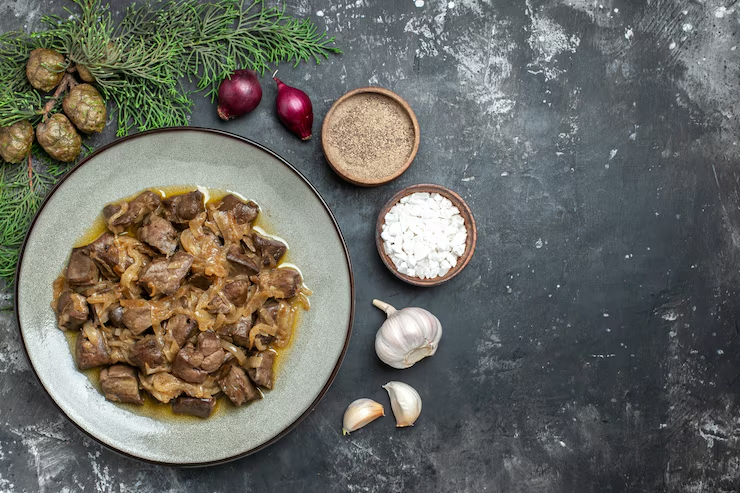
Start by using simple tips like incorporating cruciferous vegetables, using anti-inflammatory spices like turmeric and ginger, and avoiding processed foods. Experiment with flavorful, nourishing meals that suit your preferences and provide real health benefits. With a little creativity, dinner recipes for liver health can be just as delicious as they are healing.
Remember, your liver plays a crucial role in digestion, energy production, and detoxification. Supporting it through mindful eating—especially at dinner—can lead to improved vitality, better digestion, and long-term wellness. Treat your liver with care, and it will help you thrive for years to come.
FAQs
Q1. What are the best dinner recipes for liver health ?
The best dinner recipes for liver health include whole, unprocessed foods rich in fiber, antioxidants, and healthy fats. Great options are grilled salmon with steamed broccoli, lentil and spinach stew with turmeric, or quinoa bowls topped with roasted vegetables and garlic. These meals support detoxification, reduce inflammation, and help prevent liver fat buildup.
Q2. Can plant-based meals improve liver function at dinner time ?
Yes, plant-based dinner recipes for liver health are excellent for supporting liver function. Meals made with legumes, leafy greens, cruciferous vegetables, and whole grains help reduce liver fat, lower inflammation, and support digestion. They’re also naturally low in saturated fat and free from harmful additives.
Q3. Are soups and stews good dinner choices for liver health ?
Absolutely. Soups and stews made with vegetables, lentils, ginger, garlic, and turmeric are highly beneficial dinner recipes for liver health. They hydrate the body, provide essential nutrients, and are easy to digest, making them ideal for nighttime liver support.
Q4. How often should I eat liver-friendly dinners to see results ?
For noticeable improvements in liver health, aim to include dinner recipes for liver health at least 4–5 times per week. Consistency is key—paired with a healthy lifestyle, regular liver-supportive meals can reduce liver fat, improve enzyme levels, and enhance overall well-being over time.
Q5. What ingredients should I avoid in liver-friendly dinner recipes?
Avoid ingredients like added sugars, refined carbs, processed meats, excessive salt, and trans fats in dinner recipes for liver health. These can increase liver fat, cause inflammation, and burden the liver. Instead, choose clean, whole food ingredients that nourish and protect liver function.

